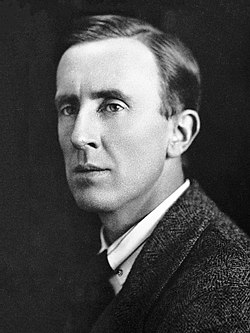J.R.R. Tolkien Quote
As you go down the water,’ he said, ‘you will find that the trees will fail, and you will come to a barren country. There the River flows in stony vales amid high moors, until at last after many leagues it comes to the tall island of the Tindrock, that we call Tol Brandir. There it casts its arms about the steep shores of the isle, and falls then with a great noise and smoke over the cataracts of Rauros down into the Nindalf, the Wetwang as it is called in your tongue. That is a wide region of sluggish fen where the stream becomes tortuous and much divided. There the Entwash flows in by many mouths from the Forest of Fangorn in the west. About that stream, on this side of the Great River, lies Rohan. On the further side are the bleak hills of the Emyn Muil. The wind blows from the East there, for they look out over the Dead Marshes and the Noman-lands to Cirith Gorgor and the black gates of Mordor.
As you go down the water,’ he said, ‘you will find that the trees will fail, and you will come to a barren country. There the River flows in stony vales amid high moors, until at last after many leagues it comes to the tall island of the Tindrock, that we call Tol Brandir. There it casts its arms about the steep shores of the isle, and falls then with a great noise and smoke over the cataracts of Rauros down into the Nindalf, the Wetwang as it is called in your tongue. That is a wide region of sluggish fen where the stream becomes tortuous and much divided. There the Entwash flows in by many mouths from the Forest of Fangorn in the west. About that stream, on this side of the Great River, lies Rohan. On the further side are the bleak hills of the Emyn Muil. The wind blows from the East there, for they look out over the Dead Marshes and the Noman-lands to Cirith Gorgor and the black gates of Mordor.
Related Quotes
About J.R.R. Tolkien
From 1925 to 1945 Tolkien was the Rawlinson and Bosworth Professor of Anglo-Saxon and a Fellow of Pembroke College, both at the University of Oxford. He then moved within the same university to become the Merton Professor of English Language and Literature and Fellow of Merton College, and held these positions from 1945 until his retirement in 1959. Tolkien was a close friend of C. S. Lewis, a co-member of the informal literary discussion group the Inklings. He was appointed a Commander of the Order of the British Empire by Queen Elizabeth II on 28 March 1972.
After Tolkien's death his son Christopher published a series of works based on his father's extensive notes and unpublished manuscripts, including The Silmarillion. These, together with The Hobbit and The Lord of the Rings, form a connected body of tales, poems, fictional histories, invented languages, and literary essays about a fantasy world called Arda and, within it, Middle-earth. Between 1951 and 1955 Tolkien applied the term legendarium to the larger part of these writings.
While many other authors had published works of fantasy before Tolkien, the tremendous success of The Hobbit and The Lord of the Rings ignited a profound interest in the fantasy genre and ultimately precipitated an avalanche of new fantasy books and authors. As a result he has been popularly identified as the "father" of modern fantasy literature and is widely regarded as one of the most influential authors of all time.
